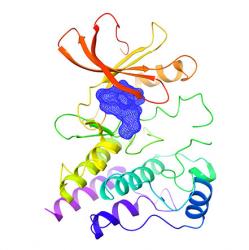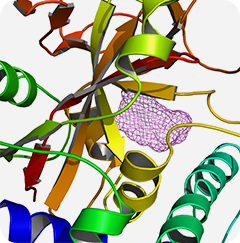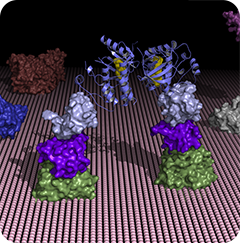Developing the
Medicines of Tomorrow
R&D is an art as much as it is science. Our innovation team consists of dedicated scientists in biology, chemistry, pharmacology, translational medicine, and clinical science who are challenged with the mission of innovating tomorrow’s medicines. Their responsibility, their passion, is the opportunity to help the world’s cancer patients. Cancer has no borders and neither do we.

Molecularly Targeted Agents
With breakthroughs in gene sequencing and other methods of tumor characterization, cancer has been redefined from a paradigm of classification based on tissue of origin to one of specific molecular characteristics, such as abnormalities in HER2, BRCA, BRAF, ALK and EGFR genes and proteins. The ability to identify specific disease subpopulations through mutations in certain genes and proteins has proven critical in oncology, making new treatments more effective than ever before. This “rational” drug design, in which targets are selected based on their observed role in cancer cell growth and survival, has been the cornerstone of BeiGene’s development efforts from the beginning, and we have three molecularly targeted investigational medicines in clinical trials.

Our BTK inhibitor; a potential mono- or combination therapy for B cell malignancies.

Our investigational small molecule inhibitor of PARP1 and PARP2, currently being evaluated as a monotherapy or in combinations in solid tumors.

Our investigational RAF dimer inhibitor, currently being evaluated as a monotherapy and in combinations in solid tumors with MAPK pathway aberrations.
Immuno-Oncology Therapies
It sounds simple; but harnessing the body’s own immune system to fight cancer is a complex endeavor. Immune checkpoints are molecules on certain immune cells that are activated or inactivated to start an immune response. Our research and development team is focused on the PD-1/ PD-L1 axis as well as other aspects of tumor-associated immune cells in order to develop novel drugs which will enhance the ability of immune cells to mount a response against cancer cells. Additionally, we are trying to identify the mechanisms by which tumors evade immune systems and target other weak points in the cancer immunity cycle.

Our anti-PD-1 antibody, an immune checkpoint inhibitor, currently being evaluated as a monotherapy and in combinations in solid tumors and B-cell malignancies.
Combination Therapies
Targeted cancer treatments block essential biochemical pathways or mutant proteins that are required for tumor cell growth and survival. Still, there can be other immune mechanisms within the body that can impede a patient’s response. Our R&D engine is evaluating combination therapies that target distinct steps of anti-tumor immunity, exploring synergies that could result in stronger and more sustained responses in tumor destruction. We believe that combining immuno-oncology (I-O) agents with targeted treatments may lead to more durable responses and improved survival rates. With our innovative cancer biology platform and advanced cancer models built to test I-O combination therapies efficiently, BeiGene’s R&D hopes to discover the next generation of cancer treatments.
Our Combination Opportunities
We are exploring the role of our internally developed assets in combination therapy treatments in oncology. We believe there may be a strong rationale supporting the combinations of our anti-PD-1 antibody tislelizumab with some of our clinical stage assets and the combinations of our BTK inhibitor with other assets. Our additional preclinical programs target weak points in the immunity cycle as well.
Zanubrutinib in Combination with GAZYVA® (obinutuzumab)*
Zanubrutinib is our investigational small molecule inhibitor of BTK that is currently being evaluated as a monotherapy and in combination with other therapies to treat various lymphomas. We are also evaluating zanubrutinib in combination with GAZYVA®, an approved anti-CD20 antibody therapy, in a global pivotal Phase 2 trial in relapsed or refractory follicular lymphoma (FL) patients.
Pamiparib in Combination with Tislelizumab
Pamiparib is an investigational small molecule inhibitor of PARP1 and PARP2 that is being evaluated as a potential monotherapy and in combinations for the treatment of various solid tumors. BeiGene has initiated its first combination study with its internal drug candidates in a Phase 1 trial of tislelizumab in combination with pamiparib in patients with advanced solid tumors.
Tislelizumab in Combination with Zanubrutinib
We also initiated combination studies of tislelizumab and zanubrutinib in 2016, based on encouraging synergistic effects observed in our preclinical models. In our primary diffuse large B‑cell lymphoma tumor models, we observed enhancement of anti‑tumor activity in both PD‑L1‑positive and especially in PD‑L1‑negative diffuse large B‑cell lymphoma tumor models, thus supporting our combination strategy.
Tislelizumab in Combination with BGB-A1217
We initiated a combination study of tislelizumab with our investigational TIGIT antibody BGB-A1217. The combination was generally well-tolerated with no dose-limiting toxicity and we’ve identified a recommended Phase 2 dose.
